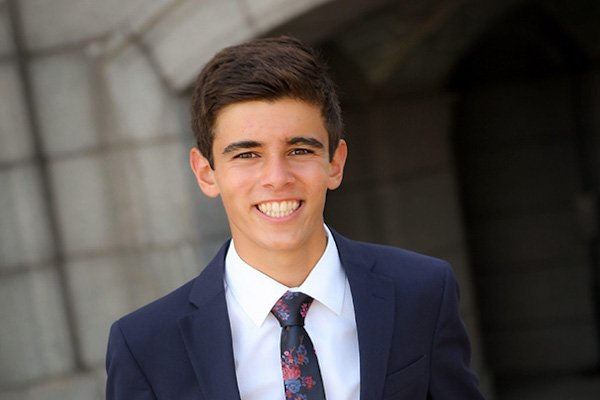Q&A with biomedical engineering student Adam Boeckermann

CSE undergrad discusses summer research internship in Germany and his love for engineering and medicine
Dec. 2, 2022
While poking around on the University of Minnesota Honors Program website, biomedical engineering student Adam Boeckermann stumbled across an interesting opportunity—an undergraduate summer research internship in Germany.
The German Academic Exchange Services’ Research Internships in Science and Engineering (RISE) program is a 6- to 12-week program that allows students to study at some of the top research institutions in Germany. For Boeckermann, a Minnesota native with a love for applying engineering to the medical field, it was a perfect fit. And by the end of the spring 2022 semester, he was on a plane to Frankfurt.
Boeckermann spent the summer doing research at the University of Tubingen on PET tracers and diagnostic imaging for diseases like Parkinson’s and Alzheimer’s.
In this Q&A, Boeckermann—who receives a scholarship from CSE's Joyce Ekman Davis Fund in Biomedical Engineering—talks about his research, what it’s like to work in a foreign country, and how his experiences both abroad and in the College of Science and Engineering have prepared him for the future.
Tell us about the research you were doing in Germany.
My research was in PET tracer development. PET, or positron emission tomography, is an imaging technology that’s used to see what’s going on in the body, similar to MRIs and other sorts of imaging. A really good PET tracer basically lets you see the pathology in the brain. I was figuring out molecules that could be used as potential PET tracers for Alzheimer’s disease and Parkinson’s disease. Imaging is really important, not only in diagnosing a disease, but also as a parallel tool that can be used alongside treatments and drugs.
What was the most important thing you learned from your experience working in a foreign country?
One major thing that stuck out to me was the importance of unified collaboration. The lab I was working at had students from across Europe and Asia. There were people coming from very different backgrounds, but at the same time, everyone was unified within the lab group, and everyone knew how to communicate with each other. I think that was an important skill, and I think sometimes in the U.S. we can get tunnel vision. It's hard to create that unifying environment. It was really noticeable that they did a good job of creating this environment that was inclusive for everybody.
Did this experience give you any idea of what you might want to do after graduation?
I’ve definitely fallen in love with research. The more research I do, the more I realize I really like the exploratory nature of it. You're at the forefront of human knowledge. It's a very small niche thing that you're discovering, but at the same time, all these steps together are combined to make these larger breakthroughs. This summer definitely showed me that research is definitely a huge interest of mine. We'll see where next year will take me.
Are you involved in any undergrad research on campus?
For the past two years, I've been with the Hackel Lab. Dr. Ben Hackel is a professor in the Department of Chemical Engineering . My research for the past few years has been in protein engineering. It's basically looking at how we can better engineer proteins for different applications, mostly in therapeutics. Right now, I'm hopefully going to start a new project that'll be a collaboration between Professor Hackel and Professor Brittany Hartwell in the Department of Biomedical Engineering. It could potentially establish a platform for delivering small proteins across the mucosal layer that could then be used to actually make drug treatments for a lot of diseases.
Why did you choose to attend the University of Minnesota?
The U of M was the only school in Minnesota that offered biomedical engineering as a degree. I knew in terms of science and engineering and STEM, it was one of the strongest schools in Minnesota, in the Midwest, and the U.S. as a whole. I figured it would be relatively cheap for me, living in-state. It's close to home, but not too close to home, so it was perfect. I really like the Twin Cities campus. It's this nice mix of being in a metropolitan area, but also feeling like its own secluded campus. There's a lot to love about this place.
How has CSE and your education at the University of Minnesota prepared you for the future?
I’ve really enjoyed the curriculum, especially in Biomedical Engineering. Getting to take all these different classes in many disciplines, that's one aspect about BME that I really like. You get a solid foundation of this interdisciplinary focus, looking at all these different areas of STEM. I can actually learn from this diverse curriculum, the internships, and whatever my program has to teach me, and I can then build upon it in real-world settings.
Interview by Michael Miltenberger
If you’d like to support students and research in the University of Minnesota College of Science and Engineering, visit our CSE Giving website.
